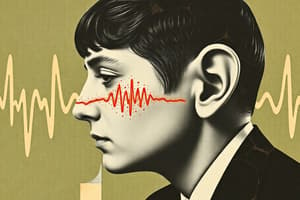Podcast
Questions and Answers
Which of the following can cause hearing loss?
Which of the following can cause hearing loss?
- Classical music (correct)
- Short duration of exposure
- Quiet sounds
- Low frequency sounds
What are the important qualities of sound in relation to hearing loss?
What are the important qualities of sound in relation to hearing loss?
- Intensity, frequency, and duration (correct)
- Decibels, hertz, and seconds
- Loudness, high note, and days
- Volume, pitch, and rhythm
What did investigators find about the impact of continuous loud sounds on hearing?
What did investigators find about the impact of continuous loud sounds on hearing?
- They can cause hearing loss after years of exposure (correct)
- They only cause hearing loss in certain occupations
- They can cause immediate hearing loss
- They have no impact on hearing
Which part of the ear is affected by noise-induced hearing impairment?
Which part of the ear is affected by noise-induced hearing impairment?
What type of sounds cause more harm to the ear than continuous sounds of similar intensity?
What type of sounds cause more harm to the ear than continuous sounds of similar intensity?
Which frequency is most affected by noise-induced hearing impairment?
Which frequency is most affected by noise-induced hearing impairment?
Why is noise-induced hearing impairment particularly important for understanding speech?
Why is noise-induced hearing impairment particularly important for understanding speech?
Flashcards are hidden until you start studying
Study Notes
Causes of Hearing Loss
- Hearing loss can be caused by exposure to loud sounds, aging, genetics, infections, and certain medications.
- Continuous exposure to loud environments without protection increases the risk of permanent hearing damage.
Important Qualities of Sound
- Sound amplitude, measured in decibels (dB), determines the loudness; higher dB levels can lead to greater risk of hearing loss.
- Frequency, measured in hertz (Hz), affects the pitch of the sound; different frequencies impact hearing in various ways.
Impact of Continuous Loud Sounds
- Investigators found that prolonged exposure to continuous loud sounds can lead to irreversible damage to the hair cells in the cochlea, leading to hearing loss.
- The risk and severity of hearing loss are cumulative, with repeated exposure compounding the effects over time.
Affected Part of the Ear
- Noise-induced hearing impairment primarily affects the cochlea, specifically the hair cells responsible for converting sound vibrations into electrical signals.
Harmful Sound Types
- Impulse sounds or short bursts of intense noise, such as gunshots or explosions, can cause more immediate and severe damage compared to continuous sounds of the same volume.
Frequency Most Affected
- Higher frequencies, often above 2000 Hz, are most severely impacted by noise-induced hearing impairment, leading to difficulty in hearing and understanding speech.
Importance for Understanding Speech
- Noise-induced hearing impairment affects high-frequency sounds, which are crucial for consonant recognition in speech, making it challenging for individuals to communicate effectively in noisy environments.
Studying That Suits You
Use AI to generate personalized quizzes and flashcards to suit your learning preferences.




